May 27 (Lunar calendar: April 9), 2023 Saturday | Dawnxisoul393art
Today, we went to "Man Mo Temple" to pay tribute to the literary God "Wenchang" and the martial god "Guan Yu" and sketching. Man Mo Temple is located on Hollywood Road in Sheung Wan, Hong Kong. It was built between 1847 and 1862. It is one of the earliest temples built in Hong Kong. Man Mo Temple is a place for worshiping gods and people in the area to discuss and resolve disputes. Man Mo Temple embodies the social organizations and religious customs of Hong Kong in the past and has important historical and social significance. In 2009, Man Mo Temple was rated as a class I historical building in Hong Kong by the Hong Kong Antiquities Advisory Committee. In 2010, Man Mo Temple was listed as a statutory monument in Hong Kong under the Antiquities and Monuments Ordinance. There are two granite drum platforms outside the main gate of Man Mo Temple. A stone lion sits on the left and right of the front yard. The temple is designed according to the traditional architectural layout. The Wenwu Temple worships the literary God "Wenchang" and the martial god "Guan Yu".
The sunlight through the lane, through the flowering branches and trees, dappled on the bricks underfoot, regardless of the temple inside and outside, as quiet and solemn, and no half of the hustle and bustle. When we entered the hall, we were faced with a huge carved wooden screen. On the gold plaque was the "divine power and universal protection" inscribed by Emperor Guangxu. "Shenwei Puyou" plaque is an important cultural relic in the Wenwu temple, which means Shenwei protects the shade and protects all living beings. During the second year of Guangxu (1876) to the fourth year of Guangxu (1878), many provinces in the mainland suffered from serious drought and the people were unable to make a living. Hong Kong raised silver money to help the victims. Emperor Guangxu was awarded the plaque in the fifth year of Guangxu (1879) in recognition of this kindness. The temple is dedicated to the two gods, "Wen" and "Wu"("Civil" and "Military"), as the saying goes, Wen can secure the state and Wu can fix the country. We pay tribute to the gods and goddesses of security and fix the country, just to pray for peace. The God of literature (Wenchang) holds a brush and is responsible for literature and official salary, while the God of Martial Arts (Guan Yu) wears a robe and holds a long sword, representing loyalty and martial strategy.
"Wenchang" God is the God in charge of fame and wealth respected by the people and Taoism. Wenchang is called "Wenchang star". In ancient times, people thought it was the star that presided over fame. Wenchang God has become the God in charge of the achievements, fame, and wealth of scholars believed by Chinese folk and Taoism, which is related to the "Zitong emperor". In 374 ad, Zhang Yu, a native of Shu, claimed to be the king of Shu. He revolted against Fu Jian of the former Qin Dynasty and died bravely. People built Zhang Yu temple for it in Qiqu mountain, Zitong county, and honored him as the "Leize Dragon God". At that time, there was another "Zitong God" Yazi temple in Qiqu mountain. Because the two temples were adjacent, later generations collectively called the two temples "Zhang Yazi", and it was said that Zhang Yazi died in the war. In 1316 ad, the emperor of the Yuan Dynasty granted Zhang Yazi the title of "emperor Lu Hongren, the Secretary of Wenchang in the Yuan Dynasty", so Zhang Yazi was called "Emperor God of Wenchang". According to legend, Wenchang Emperor was the star of Wenchang in the sky and was born on earth an official seventy-three times. He was widely respected for his incorruptibility as an official, his strong nature, his clear understanding, his benevolent nature, and his love for the people. The Emperor of Heaven appointed Wenchang Dijun to an important role, and all the examinations and positions were managed by Wenchang Dijun. After the Yuan and Ming dynasties, as the imperial examination system became larger and more institutionalized, the worship of Emperor Wenchang became more common. After the yuan and Ming Dynasties, with the scale and institutionalization of the imperial examination system, the worship of Wenchang emperors became more and more common. Wenchang temples are built all over the country, and some rural academies and private schools also worship Wenchang statues or deities. Although they have been raised or abandoned from time to time, they have continued to this day. Every year, the third day of the second lunar month is the birthday of Wenchang God. Scholars of literature go to the temple dedicated to Wenchang God to worship and recite poems and compositions.
Illustrated by dawnxisoul393
"Guan Yu" God, it is said that Guan Yu was a famous general in the late Eastern Han Dynasty. At the end of the Han Dynasty, he followed Liu Bei with Zhang Fei. After Liu Bei seized Xuzhou, Guan Yu was appointed as the "Executive Taishou". In the fifth year of Jian'an (AD 200), Liu Bei was defeated by Cao Cao in Xuzhou, and Guan Yu was captured by Cao Cao. In order to protect Liu Bei's family, Guan Yu agreed with Cao Cao to surrender temporarily. Cao Cao treated Guan Yu with great courtesy. Cao Cao hosted Guan Yu with a small banquet for three days and a large banquet for five days, and was awarded the title of "Marquis of Han Shou Ting". However, Guan Yu was in Cao Ying and his heart was in Liu Bei. In order to repay Cao Cao's kindness, he made a great contribution to Cao Cao's fight against the enemy army. Cao Cao liked Guan Yu more and sent Guan Yu's hometown Zhang Liao to persuade Guan Yu to sincerely surrender. Guan Yu said, "I know Cao Cao is very kind to me, but I swear to share life and death with Liu Bei and never betray him.". Cao Cao had no choice but to listen. After hearing about Liu Bei's whereabouts, Guan Yu protected Liu Bei's wife and went to look for Liu Bei without Cao Cao's permission, and finally found Liu Bei. In 219, Guan Yu became a "Former General" and besieged Cao Cao's army, killing countless enemies and shaking China. Later, when the state of Wu attacked Liu Bei, Guan Yu was defeated and captured and killed by the Wu army with his son Guan Ping. After Guan Yu's death, he was praised by people for his kindness to soldiers and loyalty to Liu Bei. During the Yongzheng period of the Qing Dynasty, Guan Yu was respected as a "Martial Saint". In the novel Romance of the Three Kingdoms, Guan Yu ranked first among the "five tiger generals" with unparalleled martial arts. In terms of religion and culture, Guan Yu was honored as "Guansheng emperor" by Confucianism, as "Dharma Protector Jialan Bodhisattva" by Buddhism, and as "Xiangtan God" by Taoism.
In addition to the two gods, Man Mo Temple is also dedicated to the God of Pao and the City God. The temple also houses two artifacts that are over a century old, including a bronze bell dating back to the Daoguang era of the Qing Dynasty (1847) and an official palanquin built in the first year of the Tongzhi era of the Qing Dynasty (1862). Man Mo Temple was built of green brick, tile, wood, stone, and other building materials. The components of the front of the temple, such as columns and beams, used stone instead of commonly used wood. Man Mo Temple was a typical traditional Chinese folk architecture, decorated with exquisite ceramic sculpture, granite carving, wood carving, grey sculpture, and mural, showing exquisite traditional technology. Man Mo Temple had two types of walls, circular and triangular, both decorated with brick sculptures and ceramic sculptures, the images were mainly character stories, with clear layers, rich forms, and ups and downs, enriching the monotonous walls and highlighting the artistic style of traditional brick sculptures in the Lingnan area.
Illustrated by dawnxisoul393
The largest number of carvings in Man Mo Temple were wood carvings, with exquisite carving and rich patterns, highlighting the technological level of traditional wood carvings. The shrines and all gold lacquer wood carvings in the temple fully reflected the traditional characteristics of Lingnan wood carvings, and the patterns were full of auspicious meanings. After a century and a half of wind and rain erosion, the vicissitudes of life seemed to have left no trace here. Or the cornice and arch wall, or the green lights in the ancient hall, or the endless pilgrims, or the music of Brahma. This temple, which covered an area of only hundreds of square meters and was located in the downtown of Hong Kong Island, was still full of incense after earthly wind and frost. The winding incense was remembering the grace of the two gods of civil and military affairs. Inside the temple were four huge incense burners, equipped with eighteen weapons on both sides, cast with four ministers of literature and military. Within the shrine, the gods Wenchang and Guan Yu are enshrined sides by side, and the top and bottom of the shrine were gilded and glorious.
In the temple, countless spiral incense towers hung on the hall, and the smoke curled up, making people dizzy. These swirling incense towers represented people's wishes for health, wealth and happiness, and contained countless beautiful thoughts. For more than a hundred years, the people who came from far, the men and women who came in admiration of the name, worshiped here, bowed and made wishes, the curling smoke, could not be dispersed, blowing constantly, lingering here. As for those wishes and prayers, it doesn't matter whether they can become a reality. What matters is that they were full of piety and happiness here. Although the temple had been repaired or rebuilt several times, the overall appearance of the temple remains the same. The bronze bell, tripod, pewter censer, and the carefully carved wooden statue seat in the temple are all ancient and antique. Man Mo Temple opens the door of convenience, not only does not charge tickets, but also takes incense for free, and provides tower incense, divine robe, and other services to a group of good believers for public bidding all year round. Man Mo Temple inherits not only incense, but also integrity and loyalty, justice, and people's hearts.
Original by dawnxisoul393,
The Man Mo Temple, Hong Kong, Dawnxisoul393




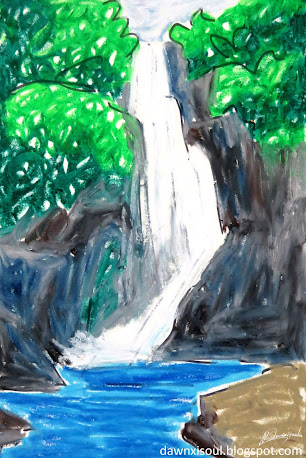
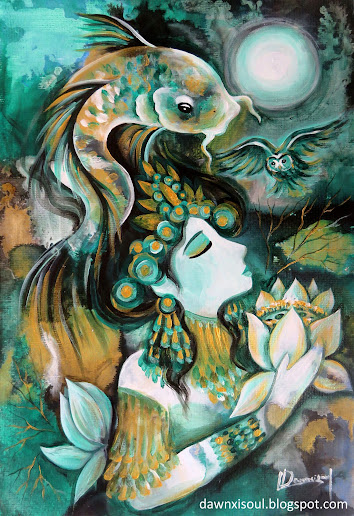

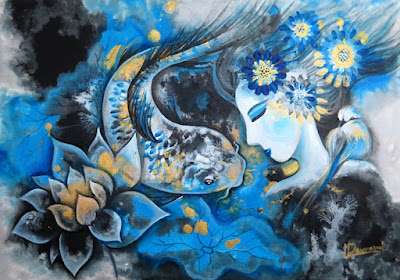
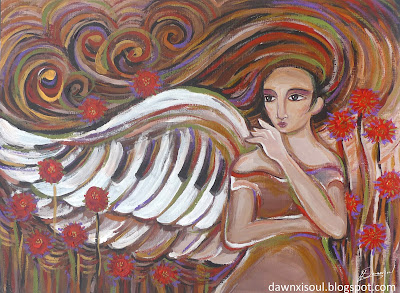



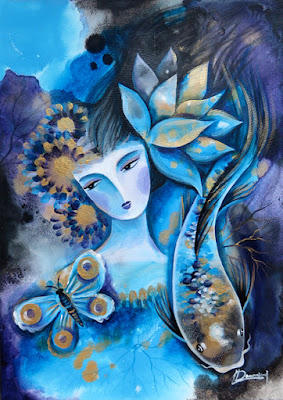
Comments
Post a Comment